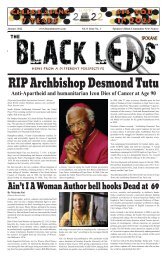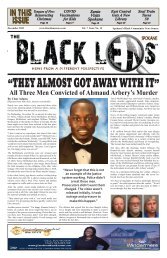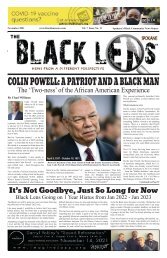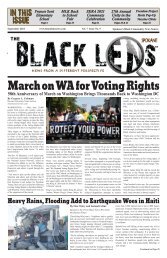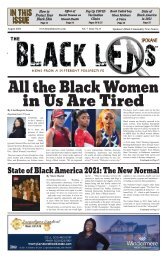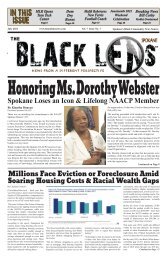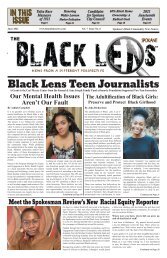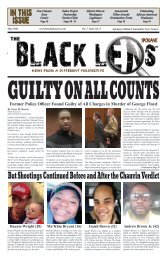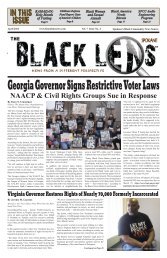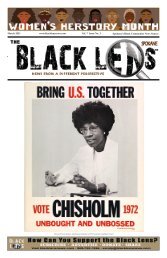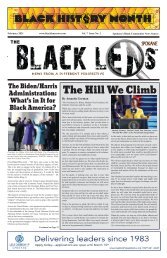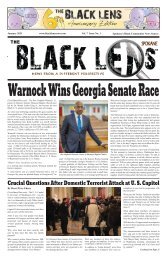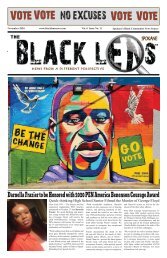Black Lens - October 2021
The Black Lens in an independent , community newspaper, published monthly and based in Spokane, WA, that covers then news, people, information and issues that are of importance to the Black community.
The Black Lens in an independent , community newspaper, published monthly and based in Spokane, WA, that covers then news, people, information and issues that are of importance to the Black community.
Create successful ePaper yourself
Turn your PDF publications into a flip-book with our unique Google optimized e-Paper software.
Page 4<br />
<strong>October</strong> <strong>2021</strong><br />
www.blacklensnews.com<br />
The <strong>Black</strong> <strong>Lens</strong> Spokane<br />
YOU SHOULD KNOW<br />
(Or Things You Probably Didn't Learn In School)<br />
ART AND HISTORY<br />
Ahmed Baba<br />
by Bertoni Jones Bey<br />
From her beginning, Europe referred to Africa<br />
as the “Dark Continent”. “Dark” more<br />
than a reference to the complexion of its<br />
people, it referenced what was seen as intellectual<br />
inferiority – Forgetting their own<br />
Dark Ages. Europe missed the intellectual<br />
glories of Western Sudan – a world-renowned<br />
center for learning boasting three<br />
major intellectual institutions – The Jingaray<br />
Ber, Sidi Yahya, and The University of<br />
Sankore founded in 989 AD. At the University<br />
of Sankore the last scholar/chancellor<br />
named Ahmed Baba maintained the<br />
scholarly standard.<br />
Ahmed Baba was born <strong>October</strong> 26, 1556<br />
near Timbuktu. His father Ahmad bin al-<br />
Hajj Ahmad bin Umar bin Muhammed<br />
Aqit was a teacher. Reading, learning, and<br />
study were requirements of the culture for<br />
every young man and in Timbuktu books<br />
were symbols of blessings, wealth, and<br />
power. When citizens built a home, not<br />
having a library in the blueprint was unthinkable.<br />
They knew that just as you need<br />
a kitchen to feed the body, you need a library<br />
to feed the mind.<br />
Imam Baba himself authored more than<br />
forty books each on entirely separate subjects.<br />
He oversaw a university system,<br />
which at its zenith boasted twenty-five<br />
thousand scholars in a city of one-hundred<br />
thousand. The university structure had no<br />
central administrative system but was a series<br />
of individual schools run by a single<br />
headmaster.<br />
In his book, “Timbuctoo the Mysterious”,<br />
author Felix Dubois quotes – “They [the<br />
scholars of Timbuktu] astounded the most<br />
learned men of Islam by their erudition.<br />
That these Negroes were on a level with<br />
the Arabian savants is proved by the fact<br />
that they were installed as professors in<br />
Morocco and Egypt. In contrast to this, we<br />
find that Arabs were not always equal to<br />
the requirements of Sankore.”<br />
Its vast offerings presented great opportunity<br />
for all scholars – law, literature,<br />
medicine and surgery, Qur’anic studies,<br />
geography, history, etymology, mathematics,<br />
and art to name a few. A “PhD” required<br />
a ten-year commitment. There were<br />
trade classes for students to learn business,<br />
farming, leatherworks, tailoring, fishing,<br />
construction, metal works, and shoe making.<br />
Once a student committed to a trade<br />
they were taught business codes and ethics<br />
for that profession. Each guild craftsman<br />
was responsible for upholding a quality of<br />
work that was up to par with his peers in<br />
that guild guaranteeing a certain standard<br />
of quality for the trade as a whole and a<br />
chance to build a name and reputation for<br />
the individual craftsman.<br />
In 1592 Timbuktu was invaded by Morocco.<br />
Ahmed Baba was the first to openly<br />
protest Moroccan occupation leading to<br />
his arrest, as well as his family, and the<br />
leading scholars of Timbuktu. They were<br />
exiled to Morocco in shackles, his house<br />
was ransacked, and his library of more than<br />
sixteen-hundred books destroyed and forever<br />
lost. Yet in Morocco, Ahmed Baba’s<br />
reputation preceded him. He scolded the<br />
Sultan of Morocco, Al Mansur for his bad<br />
manners and their poor treatment while detained<br />
and said – “I had the smallest library<br />
of any of my friends, and your soldiers<br />
took from me sixteen-hundred volumes.”<br />
Though his exile lasted twelve years he<br />
and his family were released to a high post<br />
in the Mosque of Kerifs as a teacher of law,<br />
rhetoric, and theology. Upon his departure<br />
back home in 1608, he stated to Moroccans:<br />
“May God never bring me back to<br />
this meeting, nor make me return to this<br />
country!”<br />
Ahmed Baba died in his homeland in<br />
1627 as one of Africa’s great intellectual<br />
scholars.<br />
Sources:<br />
Timbuctoo The Mysterious – Felix DuBois.<br />
Christopher Columbus and the African Holocaust<br />
– Professor John Henrik Clarke.<br />
The Destruction of <strong>Black</strong> Civilization – Chancellor<br />
Williams.<br />
muslimheritage.com/the-university-of-sankore-timbuktu/kentakepage.com/ahmed-baba/<br />
35 W. Main, Suite 250, Spokane, WA 99201<br />
Tel: 509-325-2665 • Fax: 866-376-6308<br />
Federal and State laws prohibit housing<br />
discrimination based on:<br />
Race ○ Color ○ Religion ○ Gender ○<br />
Disability ○ National Origin ○<br />
Familial Status ○ Marital Status ○<br />
Sexual Orientation ○ Military / Veteran Status ○<br />
Citizenship or Immigration status<br />
Services offered:<br />
Fair housing counseling, advocacy & education<br />
The work that provided the basis for this publication was supported in part by funding under a grant with the U.S.<br />
Department of Housing and Urban Development, HUD. NWFHA is solely responsible for the accuracy of the statements<br />
and interpretations contained in this publication.



